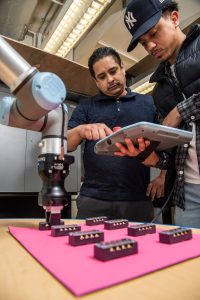
Explore New Topics and Subjects
You may think that sticking with what you already know will be “safer” than trying something new. But this prevents you from taking advantage of new opportunities to learn. Operate from what you know as a base and take risks. Since you are in this new college environment, stretch your understanding by exploring new classes, topics, and subjects. Connect what you know already to new material.
Find Connections in the Classroom
Ideas connect. Finding those connections is what a good student does and is an essential skill in today’s rapidly changing workplace that is ever more interdisciplinary. Use classroom and study time to actively seek connections among subjects, topics, and ideas that may on the surface seem to have no connection at all. For example, an idea discussed in a history class may suddenly make more sense after listening to a lecture in mechanical engineering. Take note of these connections which are unique and specific to your personal path of study.
study time to actively seek connections among subjects, topics, and ideas that may on the surface seem to have no connection at all. For example, an idea discussed in a history class may suddenly make more sense after listening to a lecture in mechanical engineering. Take note of these connections which are unique and specific to your personal path of study.
Finding connections among subjects is also about finding a deeper understanding of knowledge. You may be surprised by the pleasure you feel when you link ideas between courses and come across them on your own. Then, go on learning on your own:
- Be your own teacher – find one point that interests you and do further research.
- Go online and use reliable resources to explore the topic further.
- Use the textbook as a base, along with your notes from classes, to find other materials. This will expand your awareness of the topic to supplement the class lessons.
- Explore how ideas are similar and how they are dissimilar from each other. Consider the opposite of any idea with which you are presented.
- Consider and investigate how your learning relates to the job market and the larger world. Cultivate the skills you already possess by learning about opportunities on campus. Consider how your individual skills and strengths fit into your chosen field, career, and graduate studies.
Knowledge through Connections
We may think of ourselves as individual learners, competing with other individual learners. We may feel that we must “buckle down” and struggle to learn on our own. And yet, we each bring strengths and specialized experiences and knowledge to the problems that need solving. Working with others, whether professors or fellow students, allows us to capitalize on the strengths they bring, while also sharing our own.
Consider these approaches to learning that depend on connections with others.
- The physical manipulation of objects offers an understanding of properties that are manifested in the physical world. For example, using three balls of various sizes to represent the sun, the earth and the moon will allow a visual and yet physical description of the phases of the moon. Moving paper clips from one person to another helps illustrate a chemical rate of exchange. Such physicality demonstrates challenging theoretical ideas.
- Visualization by drawing allows the brain to form images. For example, chemical bonding to form molecules is a standard tool for chemists – and chemistry students. Sharing the steps of a mathematical or historical process on a large piece of paper or on a whiteboard also shows what is not yet understood or what has been left out.
- Physical activity can create memories that underscore understanding. For example, students themselves can represent the bonds to form chemical molecules – one arm for a single bond, two arms for a double bond. That “dance” will be memorable.
- Creating a rhyme or song with others will allow for understanding and create an experience you won’t soon forget.
- Discussion with others allows for broader understanding and learning. That is why juries are powerful. Different viewpoints and observations come together to arrive at a solution. Medical teams also share their learning and arrive at solutions more quickly than practitioners operating alone.
- These mechanisms are not new. Humans have found many creative ways over the centuries to work together to create and share knowledge.
While much of our advice is aimed at your opportunities in college to gain individual knowledge, skills, and abilities, doing so with others will enrich your learning and make meaningful connections for the short and long terms.
